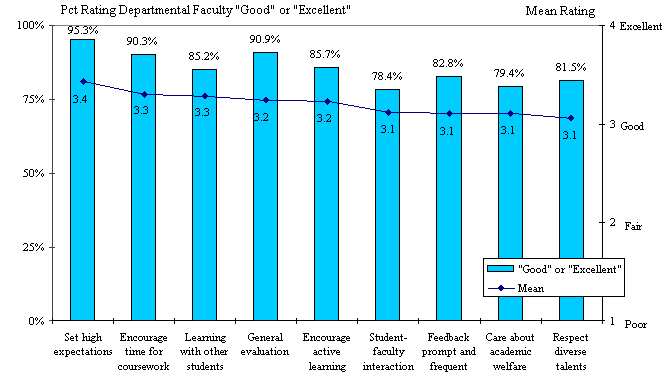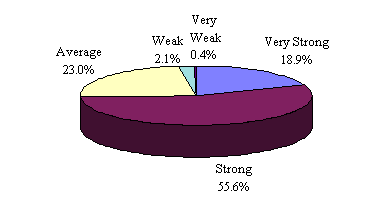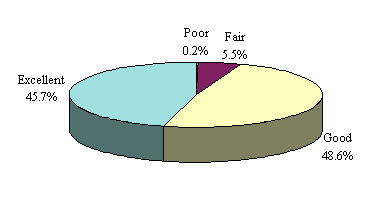![[- NC State University -]](https://report.isa.ncsu.edu/Survey/images/ban_logo.gif)
North Carolina State University
1998 Graduating Senior Survey:
Faculty Contributions and Academic Environment
![[- NC State University -]](https://report.isa.ncsu.edu/Survey/images/ban_logo.gif)
North Carolina State University
1998 Graduating Senior Survey:
Faculty Contributions and Academic Environment
This report presents selected results from NC State�s 1998 Graduating Senior Survey. Graduating seniors were asked to rate the extent to which NC State had contributed to educational areas such as faculty contributions, quality of instruction, intellectual environment, and overall education.
Introduction and Methodology
This report presents selected information from the March 1998 survey of spring 1998 graduating seniors at NC State. The responses analyzed represent 53.9% of the population of those seniors who were enrolled in the spring 1998 semester and had applied to graduate as of March 30, 1998. Results of chi-square tests for sample representation (p<0.01) revealed no significant differences between survey respondents and the population by gender, ethnicity, or academic unit.
The quantitative data obtained from the 1998 Graduating Senior Survey were analyzed according to standard statistical methods. Questions with categorical responses were analyzed using chi-square tests, and all questions with numerically coded responses were analyzed using either t-tests or one-way analysis of variance (ANOVA) with Duncan�s multiple comparison procedure. The significance level for all analyses was p<0.01. Analyses were calculated omitting responses of "don�t know" and "did not use" to portray the most accurate picture of students� attitudes and opinions.
In addition to the quantitative data, the respondents were also asked two broad, open-ended questions. Responses to both open-ended questions were transcribed verbatim, and then examined for relevant themes. To represent and illustrate themes, student quotes are included throughout this and the other reports. Both open-ended and forced-choice responses are discussed in conjunction with each other.
Faculty Contributions
Graduating seniors were asked to rate faculty members in their department on nine items. To measure impact in these areas, a four-point scale was used (4="excellent" to 1="poor"). Faculty contributions generally received high ratings, with 91% of seniors rating faculty contributions overall as "good" or "excellent". The lowest ratings were given for the faculty�s concern about the student�s welfare (79%) and for student-faculty interaction (78%).
There were significant differences by gender, but not by ethnicity. Significantly more females than males felt that faculty set high expectations for students to learn. There were also significant differences by academic unit. Significantly more students in the College of Forest Resources (CFR) indicated that experiences with faculty in their major had been positive.Chart 1: Faculty Contributions

Academic Environment
Graduating seniors were also asked to rate the quality of instruction they had received, the intellectual environment, and their overall education received.
Quality of Instruction
Over 90% of students felt that the quality of instruction in their major was "good" or "excellent" and over 80% felt that the quality of instruction overall was "good" or "excellent". However, over 50% of respondents felt that quality of instruction was "excellent" in their major, while only 18% of respondents felt that the quality of instruction overall was "excellent".
There were no significant differences by ethnicity or gender. There were significant differences by academic unit. Significantly more students in CFR indicated positive responses to the quality of instruction in their major. Significantly more students in the College of Humanities and Social Sciences (CHASS) indicated positive responses to quality of instruction overall.
Chart 2: Quality of Instruction

The open-ended questions on the survey asked two questions of students: 1) what were the three most important things NC State could do to improve the quality of undergraduates� experiences here, and 2) to share any general comments they may have about their experiences at NC State or explain why they were particularly satisfied/dissatisfied with any aspect of their education at NC State. Quality of instruction and instructors� attitudes were mentioned several times in the open-ended responses. Many students felt that professors weren�t really at NC State to actually teach, but instead to do research. One student said "my worst professors at NC State were more concerned about having a paper published than educating the class. These types of professors gave fewer tests, less classroom interaction and had little variance in class activities." Another student commented that "my professors in my major seemed to be more concerned with research than with teaching us. They acted like they didn�t want to be there. I was very discouraged with their attitude." There was also a lot of concern when it came to instructors� teaching ability. One student said "I was displeased with instructors who were very knowledgeable in their subject but unable to teach the subject to the students."
The evaluation of instructors was another major concern of students. Many students felt that evaluations were not taken seriously by the administration. One student said "Require instructors who receive low or bad overall evaluations to get help with their teaching methods or style." Another student recommended "Evaluate tenure process to eliminate loss of motivation of professors, which keeps teachers more interested in teaching."
NC State�s Intellectual Environment
75% of respondents felt that NC State�s intellectual environment was either "strong" or "very strong". There were no significant differences by ethnicity or gender. There was one significant difference by academic unit: the majority of the respondents in each college, with the exception of the School of Design, indicated positive responses to the intellectual environment at NC State.
Chart 3: NC State�s Intellectual Environment

Overall Education Received at NC State
The chart below indicates respondents� ratings of the overall education received at NC State. Results show that over 90% of respondents felt that overall, the education they had received at NC State was "good" or "excellent". There were no significant differences by ethnicity, gender, or academic unit.
Chart 4: Overall Education Received at NC State

 Tables by Gender/Ethnicity
Tables by Gender/Ethnicity
 Tables by Academic Unit
Tables by Academic Unit